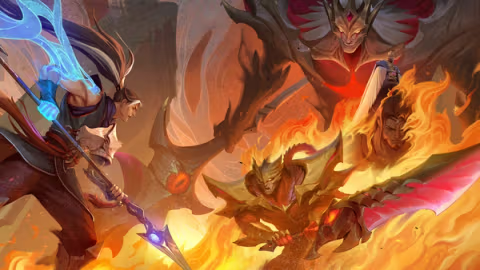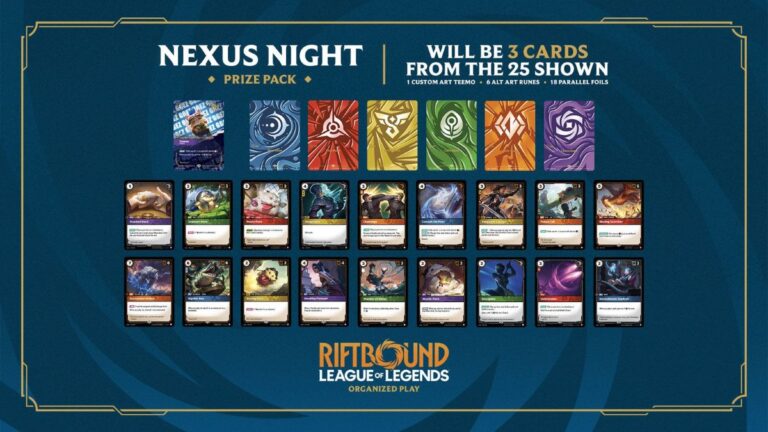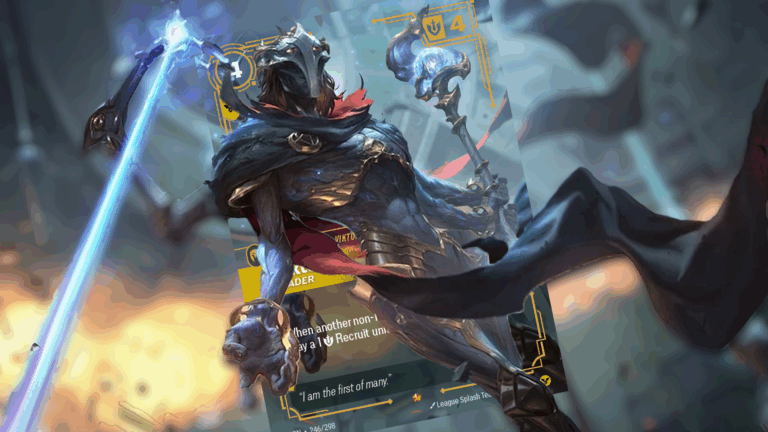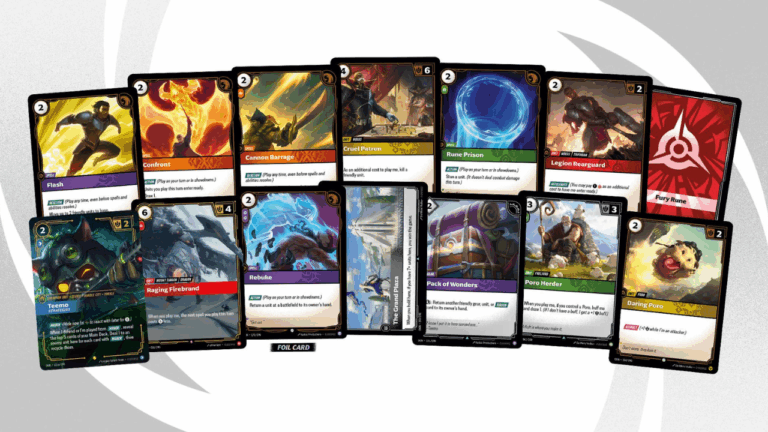Contents
Being a new and innovative card game, Riftbound has a lot of interesting mechanics that we've never seen before. One of those is the introduction of seperate Battlefields that you need to conquer. This has been seen in a few smaller card games, but with League of Legends having a massive emphasis on movement, it's no wonder that movement based mechanics play such a massive role in Riftbound.
Being so unique, though, the idea of Map control is definitely one that might be unfamiliar to players of prior TCGs. After all, it adds a whole new axis to the game and will define how the game plays out no matter which deck you're playing, Map control is a massive part of Riftbound, and failing to master it will result in your opponent taking over in the blink of an eye.
In this article, we're going to go over Battlefields and map control, as well as how it can help you take your Riftbound gameplay to the next level wholly. With this, you'll be able to easily work out the flow of map control and how you can tip the scales in your favour, as well as how some classes can take advantage of trading to control the board.
101: What is a Battlefield?
Battlefields are a new type of card in Riftbound, which are unlike anything seen in most traditional TCGs. Essentially, these are territorial disputes that define the flow of your game; to score points, you need to conquer and hold battlefields, and so your opponents will be battling with you over the control of them.
You and your opponent will have three battlefields each in your deck, and in a 1v1 game of Riftbound, you'll pick a random battlefield each. This will give you a 'Home' battlefield and an 'Away' battlefield, in which you'll generally want to keep control of your home battlefield to reap whatever benefits you get from that battlefield.
One of the key parts of Riftbound is learning exactly how to keep control of a battlefield, and how to attack a battlefield efficiently to get the most benefit out of your conquests. On top of this, knowing how many units to send to each, how many to hold back, and everything else is definitely a part of the challenge of learning the game.
You generally don't have much autonomy over the battlefield you get to play, as you pick one at random out of your three chosen, but generally speaking each deck will have a favoured battlefield or two that works with its deck. The most interesting thing, though, is how two seperate battlefields will allow you to define your gameplan in new and exciting ways.
Map Control
Generally speaking, you want to try and balance your units between both battlefields to get the most points. This is a given, though, and plays out much more differently in practice than it does in theory. Especially considering the deck that you're playing, you'll need to look at the board state to evaluate how you'll establish board control.
Distributing Units
In Riftbound, you'll generally need to be able to distribute units between battlefields often, as play takes place between two battlefields. So, if you focus on one battlefield while leaving one completely open, you can expect your opponent to be able to win the game on the other one.
However, like any rule, this does have many exceptions:
- Deck Styles: There are certain decks that are able to control using non-Unit strategies, like Kai'sa, and so these are obvious exceptions.
- Trading: We'll go over this later, but some decks will be able to trade their way into keeping the other battlefield empty, letting you focus your Units on one battlefield.
- Ganking: Ganking needs its own article to be able to go into its depth, but in any case, the mechanic allows you to be more flexible with controlling battlefields.
So, as with any rule, try to think on a case-by-case basis, as sometimes a game might be won by focusing on one battlefield. But generally, considering your strategy to be able to keep both at least somewhat covered so your opponent can't run away with one is a good strategy.
Also, you can sometimes keep your units in base for later, to build up a massive board state. This leaves them generally uninteractable, but some cards can still kill them. However, it still increases the odds that they'll be in play a few turns later.
Trading
Trading units is definitely something to learn if you want to be able to play a more technical Riftbound game. Like in Chess, trading material on the board can leave you at an advantage when done effectively, but you really need to learn exactly when this is great to be able to fully maximise your advantage when doing so.
Trading is generally when you sacrifice a unit of your own to remove an opposing unit. So, for example, it's using a 2 Might unit to take out an opposing 2 Might unit, which may seem simple, but there's a lot to consider.
You can trade with multiple units too, as three 1 Might units will trade with a 3 might unit, but you also need to consider how many cards were played to make those units. So, playing out three small units and trading them for a single unit is different to using a singular card to make three small units and trading them. The former isn't a trade, as you lose out on card advantage in hand, but the latter is
All of this is a little complicated, So, let's break it down and look at this in a real-world scenario.
Trading While Ahead
Scenario: Your opponent controls a battlefield with a 2 Might unit and no other units in play, as well as no open Energy. You have a singular 2 might unit in your base, and 4 free Energy.
Here, you'd generally want to trade the 2 Might units as even though it doesn't score you a point. it keeps your opponent off of a base, while allowing you to play a unit into your base from your hand and be on the offensive. But, this isn't a rule either. A unit with an Accelerate cost or a key piece of removal could turn this plan on its back back, so be aware.
Now, let's say that your opponent has Energy open, then obviously you'll need to consider if they have a way to blank the trade, either by buffing their unit or weakening yours. Depending on their deck, the answer will be different here, and so knowing whether to trade is very much something you'll need to consider on a case-by-case basis.
Trading While Behind
Scenario: Your opponent controls a battlefield with a 2 Might unit and another unit in play, as well as no open energy. You have a singular 2 might unit in your base, and 4 free Energy.
Trading when in this scenario (being behind in tempo) is generally a bad idea, as it'll keep you on the back foot. You'll generally want to look into card effects to get you ahead, or look to make material gains (such as killing a 2 Might unit rather than trading it).
However, there is an exception here. If an opponent has a key unit that's winning them the game and that you'd want to get rid of, then don't consider this a trade, unless you're sending one of your most powerful units as trade fodder. Like in Chess, you wouldn't mind trading a few Pawns to get rid of the Queen, as the Queen equals more than two Pawns in material.
Removal vs Trading
Because of this, it might sometimes be more effective to use removal instead of trading. But, sometimes, trading can be more beneficial as saving removal can have more utility later on. This means that you can save removal for bigger units later on.
In decks with good endgame units, you can trade away your cheaper units to be able to keep the board as clear as possible. So, don't be afraid to keep hold of removal and essentially consolidating the board to a few key units, as its much easier to remove one unit than five.
Closing Time
Battlefields are a great way that Riftbound stands out from the rest, and playing with board control in mind is going to be pivotal to taking your level of strategy to the next level. Making sure to consider this at all points of the game will give you the upper hand, and will leave you truly advantageous on the battlefield no matter the opponent.
If you're looking for more great Riftbound strategy content, check out the rest of our site. We've got a number of guides and meta content brewing as we gear up for the game's release later this year, so keep an eye out.
In any case, thank you for reading, and I'll see you on the battlefields.









